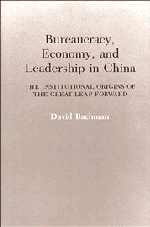Book contents
- Frontmatter
- Contents
- Preface
- Acknowledgments
- Chronology
- 1 Introduction
- Part I Historical background and conceptual approach
- 2 Overview: Chinese politics and economy, 1956–1957
- 3 Institutions and policy in China
- Part II The institutional origins of the Great Leap Forward
- Appendix: The constraints on Mao
- Bibliography
- Index
2 - Overview: Chinese politics and economy, 1956–1957
Published online by Cambridge University Press: 21 March 2010
- Frontmatter
- Contents
- Preface
- Acknowledgments
- Chronology
- 1 Introduction
- Part I Historical background and conceptual approach
- 2 Overview: Chinese politics and economy, 1956–1957
- 3 Institutions and policy in China
- Part II The institutional origins of the Great Leap Forward
- Appendix: The constraints on Mao
- Bibliography
- Index
Summary
The convocation of the Eighth National Congress of the Chinese Communist Party (CCP) in September 1956 marked a fundamental transition in the relationship between the Chinese state and Chinese society. By mid 1956 the outcome of the transition to socialism had been decided. All the institutional arrangements the Chinese leadership then associated with a socialist state (collectives in the rural sector, effective state ownership of the means of production, and an articulated bureaucratic structure) were then in place. These institutions and the policies that had spawned them were not functioning very well, but the transition period had been completed.
Chinese leaders were justifiably proud of the rapid progress they had made. But once the clear and well-defined tasks of the transition period were accomplished – a decade or more ahead of schedule – the historical experience of the Soviet Union and the existing ideological and policy visions of the Chinese leadership became much less relevant. The fundamental goal of building a powerful socialist state remained, but that goal would not be achieved in the near future, and its attainment seemed to require the somewhat mechanical process of adding new industrial facilities. To be sure, the leadership was concerned about the problems caused by abrupt collectivization of the countryside and the transition to socialism in the urban areas, and many officials were preoccupied with trying to make the new institutions work more efficiently.
- Type
- Chapter
- Information
- Bureaucracy, Economy, and Leadership in ChinaThe Institutional Origins of the Great Leap Forward, pp. 13 - 28Publisher: Cambridge University PressPrint publication year: 1991



